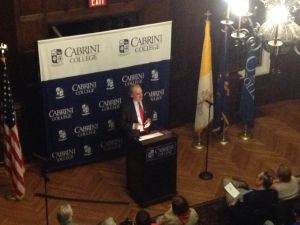History filled the room at the Joylon Pitt Girard Scholar-in-Residence Keynote Lecture as Pulitzer Prize-winning author, Douglas Blackmon, spoke to staff and students.

Blackmon is the author of The New York Times best seller “Slavery by Another Name: The Re-Enslavement of Black Americans from the Civil War to World War II.” This non-fiction book explores the story of Green Cottenham, an African American slave, and the overall fight for equality that slaves endured.
Dr. Daryl Mace, chair of the history and political science department, took part in suggesting to bring Blackmon to campus.
“When we were selecting the recipient of the Scholar-in-Residence, I knew I wanted Douglas Blackmon. I am a huge fan of his book and it has a prominent space on my bookshelf,” Mace said as he pulled down the book which is covered in tabs that he placed in it.
The mansion was calm as the audience was focused and attentive at what they were learning from Blackmon. He provided great intellect that described the logistics and emotions behind the enslaved.
“Over time, the system…the rigid terroristic system has made it impossible for African Americans to live their life without having a violation,” Blackmon said during his speech. “Talking too loudly and selling crops after dark was considered a crime because some white man controlled your life. If there wasn’t something that caused this, then was there something wrong with black people?”
While it showed that Blackmon is clearly very passionate about this subject, he also showed his sense of humor when he made a comment that he was being booed off the stage. In reality, the grandfather clock was alerting us that 8 o’clock had arrived.
People enjoyed his light-hearted spirit as he explained how his childhood made him question why things were the way that they were. Growing up by the Mississippi delta, he experienced racial segregation firsthand.
“Between 1900 and World War II, people who were desperately poor were no longer in that situation. Except for African Americans. It occurred to me that all of the people that I knew from church or school had drastically different lives than I did.”
All that he spoke about as a child was foreshadowing his legacy. He showed hints that he would become a historian and journalist fighting for social justice.
Jim Flanagan, junior American studies major, was in attendance and marveled at how Blackmon’s passion stuck with him from his youth.
“It was interesting that he would keep up on what he saw and experienced when he was 12. The fact that he still relates back those memories really made an impact,” Flanagan said.
Blackmon made a solid statement towards the end of his speech as he approached the topic of modern-day segregation.



